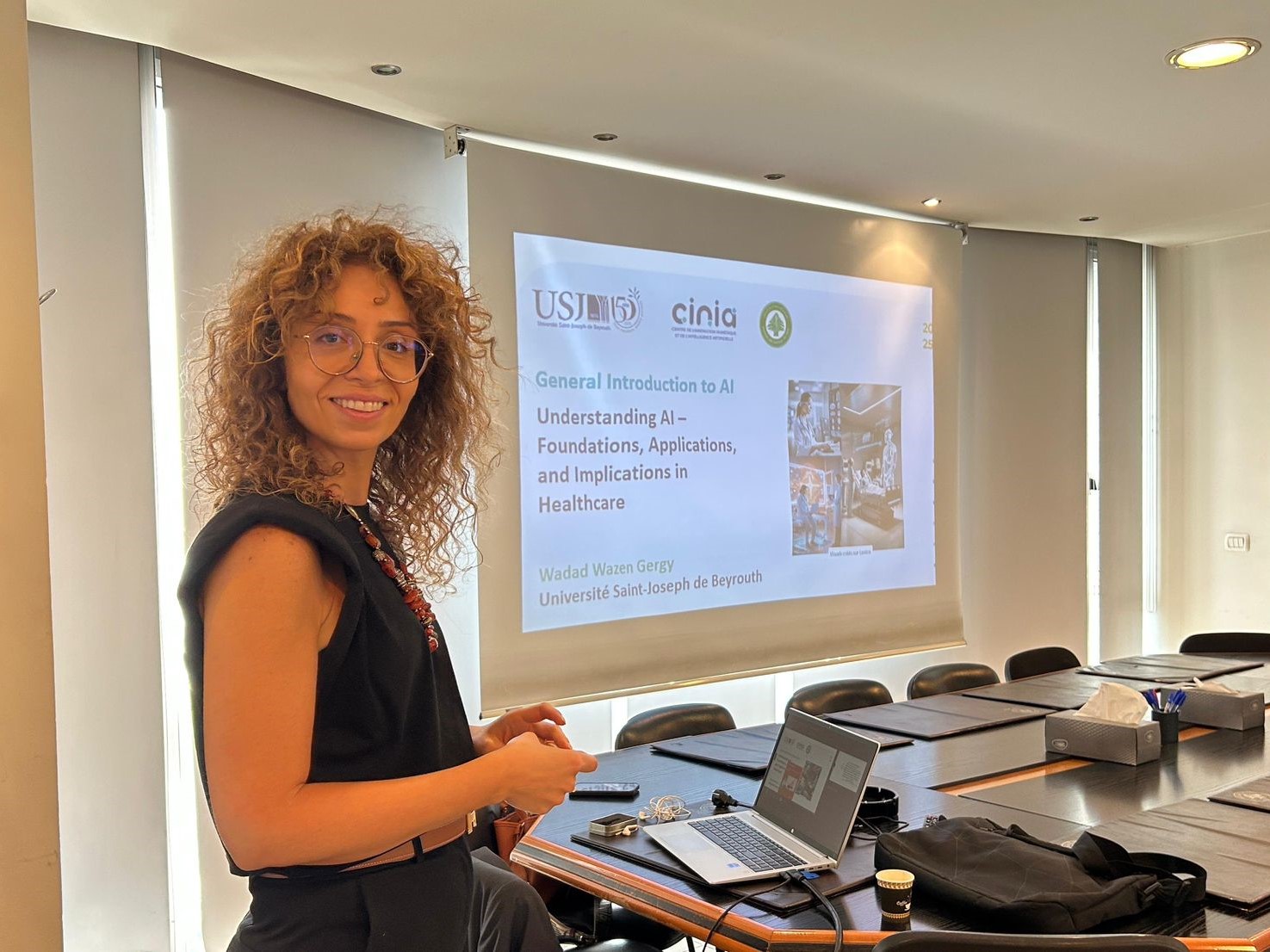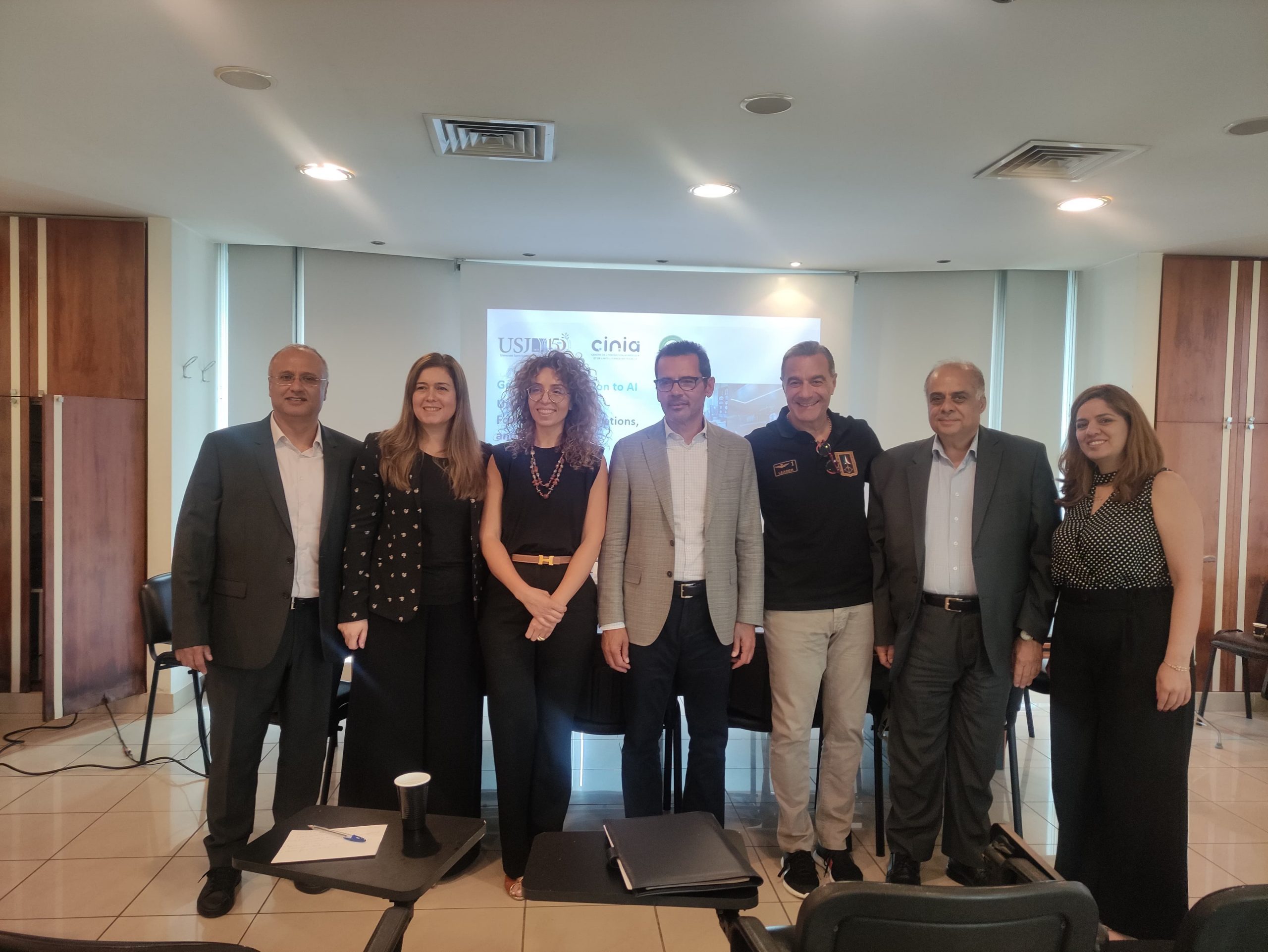© 2025 Center for Digital Innovation and AI
À l’occasion de la Journée de l’intelligence artificielle en santé, organisée par le Syndicat des Hôpitaux au Liban, l’Université Saint-Joseph de Beyrouth (USJ) a marqué une présence forte à travers l’intervention de Madame Wadad Wazen Gergy, Directrice du Centre de l’Innovation Numérique et de l’Intelligence Artificielle (CINIA).
Intitulée « Comprendre l’IA – Fondements, applications et implications dans le secteur de la santé », cette session inaugurale s’est distinguée par la richesse de son contenu et la clarté de sa vision. Elle a offert aux participants un véritable voyage au cœur de l’intelligence artificielle, depuis ses définitions fondatrices jusqu’à ses applications les plus avancées dans le domaine médical.
Cette rencontre, fruit d’une collaboration entre le CINIA, l’Institut Supérieur de Santé Publique (ISSP), le Centre de Formation Professionnelle (CFP) et le Syndicat des Hôpitaux, a permis d’aborder les grands enjeux de l’IA dans un esprit de partage interdisciplinaire, réunissant experts, professionnels de santé et responsables d’institutions hospitalières.
Madame Wazen Gergy a brillamment exposé les concepts clés de l’IA, apprentissage automatique, réseaux neuronaux, intelligence générative, en les illustrant par des cas concrets : détection précoce de maladies à partir d’images médicales, personnalisation des traitements, chirurgie robotisée, assistants virtuels, automatisation des tâches administratives, ou encore optimisation des essais cliniques.
Mais au-delà des innovations technologiques, elle a mis en lumière les défis éthiques cruciaux liés à l’usage de l’IA en santé : biais algorithmiques, opacité des décisions automatisées, confidentialité des données, consentement éclairé et responsabilité juridique. Un plaidoyer fort en faveur d’une IA éthique, inclusive et transparente, au service du patient et du corps médical.
« Science sans conscience n’est que ruine de l’âme », rappelait-elle, citant Rabelais pour souligner la nécessité d’un encadrement humain et critique des outils technologiques. Face à l’essor rapide de l’IA, elle a appelé à une mobilisation collective : former, réguler, expérimenter, mais toujours dans le respect de la dignité humaine.
À travers cette participation, l’USJ réaffirme son rôle moteur dans la réflexion éthique et l’accompagnement du virage numérique en santé, et s’engage à former une génération d’acteurs éclairés, capables de conjuguer innovation et responsabilité.


On the occasion of the Artificial Intelligence in Healthcare Day, organized by the Syndicate of Hospitals in Lebanon, the Saint Joseph University of Beirut (USJ) made a remarkable contribution through the keynote delivered by Ms. Wadad Wazen Gergy, Director of the Center for Digital Innovation and Artificial Intelligence (CINIA).
Entitled “Understanding AI – Foundations, Applications, and Implications in Healthcare”, the opening session stood out for the richness of its content and the clarity of its vision. It offered participants an enlightening journey into the world of artificial intelligence—from its foundational definitions to its most advanced medical applications.
This event, the result of a collaborative effort between CINIA, the Higher Institute of Public Health (ISSP), the Center for Continuing Professional Education (CFP), and the Syndicate of Hospitals, provided an interdisciplinary platform for dialogue, bringing together experts, healthcare professionals, and institutional leaders.
Ms. Wazen Gergy skillfully demystified key AI concepts, machine learning, neural networks, generative intelligence, illustrating them with concrete examples: early disease detection through medical imaging, personalized treatment plans, robotic surgery, virtual assistants, administrative automation, and accelerated clinical trials.
Beyond technological advancements, she shed light on the major ethical challenges tied to AI integration in healthcare: algorithmic bias, opacity of automated decisions, data privacy, informed consent, and legal accountability. It was a powerful call for an ethical, inclusive, and transparent AI, serving both patients and medical professionals.
Quoting Rabelais, she reminded the audience that « Science without conscience is but the ruin of the soul, » emphasizing the urgent need for human-centered and critically guided use of technology. In the face of rapid AI development, she urged collective action: to educate, regulate, and innovate—always with respect for human dignity.
Through this contribution, USJ reaffirms its leading role in the ethical discourse and support of the digital transformation in healthcare, and commits to training a generation of enlightened professionals capable of combining innovation with responsibility.


Leave a Reply Cancel reply
CINIA is located on the 7th floor of the USJ Human Sciences Campus on Damascus Street in Beirut.
Do not hesitate to contact us at cinia@usj.edu.lb
or call us at +961 1 421 000 extension 5923/5924.
© 2025 Center for Digital Innovation and AI. Created for free using WordPress and Kubio


No responses yet